www.flickr.com
This is a Flickr badge showing public photos from GothamOddISee. Make your own badge here.
The Essentials
- The Pain King
- Quinn!
- The Kyle Conspiracy
- Crippled Vulture
- Jareth Goblin King
- The Amazing Adventures
- Ya Ya You Is Welcome
- ones and zeroes
- Lapsus Linguae
- Cinematical
- Think Progress
- Bizarre News
- Overheard in New York
- Fact Check
- Pitchfork Reviews
- Media Matters
- Happy Tree Friends
Accumulated Acumen
- October 2004
- November 2004
- December 2004
- January 2005
- February 2005
- March 2005
- April 2005
- May 2005
- June 2005
- July 2005
- August 2005
- September 2005
- October 2005
- November 2005
- December 2005
- January 2006
- February 2006
- March 2006
- April 2006
- May 2006
- June 2006
- July 2006
- August 2006
- September 2006
- October 2006
- November 2006
- December 2006
- January 2007
- February 2007
- March 2007
- April 2007
- May 2007
- June 2007
- July 2007
- August 2007
- September 2007
- November 2007
- December 2007
- January 2008
- February 2008
- March 2008
- July 2008
- September 2008
- October 2008
- April 2009
Declare independence! Don't let them do that to you!!
Thursday, January 20, 2005
Total Price For Inauguration: 40 Million Dollars
or
200 ARMORED HUMVEES
or
20 MIllion disease vaccinations for tsunami victims
(Zig Heil, Baby!)
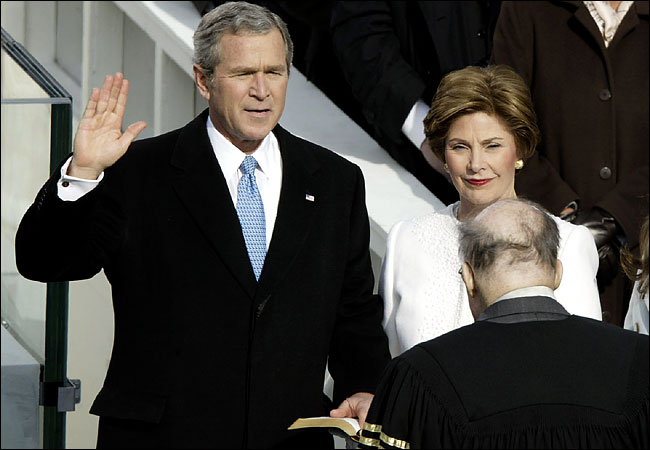
(Cheney takes the customary inaugural tinkle on the Constitution)
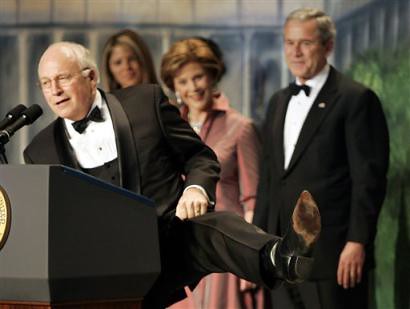
In 1945 knee deep in the second world war, FDR's inauguration axed both parades and balls. Instead they had a 6 minute ceremony that cost $2000 which consisted of chicken salad. Then it was back to work.
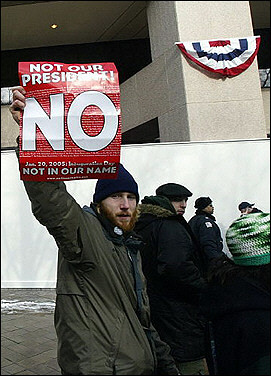
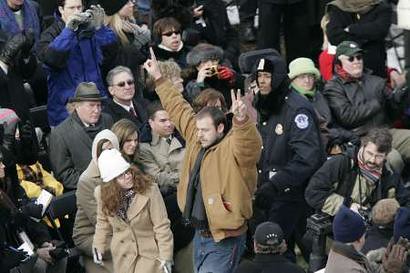
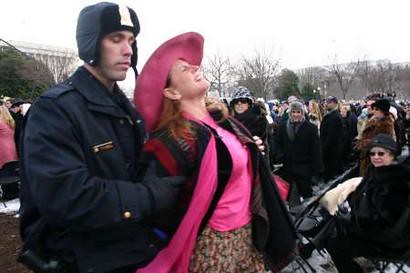
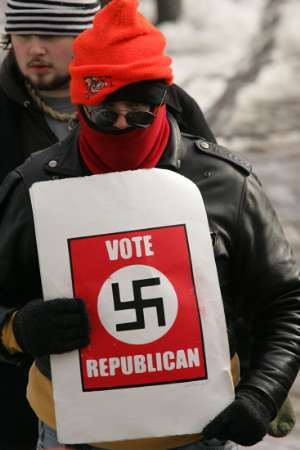
CBS Poll: No Second Honeymoon
NEW YORK, Jan. 19, 2005
As President Bush heads into his second term, a CBS News/New York Times poll
finds a widespread feeling among Americans that the nation is headed in
the wrong direction and little expectation that Mr. Bush's policies
will change things over the next four years.
Fifty-eight percent of Americans say their outlook on a second Bush
term is generally optimistic – a low number when compared to Mr. Bush's
approval rating before his first term or Bill Clinton's before his
second. At the same time, 56 percent say the country is on the wrong
track, versus 39 percent who say it is on the right track.
Looking four years down the line, most Americans see very little
changing, despite the ambitious agenda Mr. Bush is laying out for his
second term.
Most expect they will be as safe from terror at the end of a second
Bush term as they are today, but not safer. They think the economy and
education system will be the same, but not better.
Despite Mr. Bush's focus on tax cuts, 41 percent of Americans say
their taxes will be higher in four years, while just 9 percent say
their taxes will be lower; 47 percent expect their taxes to be the
same.
While Mr. Bush has a stated goal of cutting the national deficit in
half, two-thirds of Americans expect the deficit to be higher after
four years.
A slight plurality of Americans, 38 percent, say there will be
fewer U.S. troops in Iraq by the end of a second Bush term. But 30
percent say there will be more, and 28 percent say the number will be
the same.
As for the most ambitious and controversial item on Mr. Bush's
agenda – overhauling Social Security - Americans expect to see big
changes by 2008. But 50 percent say Mr. Bush's call for private
retirement savings accounts is a bad idea, versus 45 percent who say
it's a good idea.
Support for Social Security privatization drops even lower when
people are informed it would mean cuts in the guaranteed benefits paid
to retirees. Seventy-eight percent say combining benefit cuts and
private investment accounts is a bad idea.
Moreover, six in ten Americans say it's unlikely they'd even
participate in a system that allows them to invest their Social
Security taxes in the stock market. Only 17 percent say they'd be very
likely to do so, with another 22 percent somewhat likely.
Those already actively investing in the stock market and those
making over $100,000 a year are the most receptive to private Social
Security accounts.
While Mr. Bush has spoken recently of the need to heal the wounds
of the divisive election, the public remains highly partisan and
dubious that he can unite them. Just 44 percent of Americans believe he
will bring the country together, while 47 percent think he will divide
them.
Mr. Bush's 49 percent approval rating at the start of his second
term trails every re-elected U.S. president in the past half-century.
By comparison, Bill Clinton's approval rating was 60 percent, Ronald
Reagan's 62 percent and Dwight Eisenhower's 73 percent at a similar
point in their careers.
Even Richard Nixon — just a year and a half before he was forced to
resign the presidency — fared better than Mr. Bush with an approval
rating of 51 percent when he took his second oath of office in January
1973.
Mr. Bush's approval rating, however, has risen significantly since
its low mark of 41 percent last May following a flood of violence in
Iraq. His highest rating, 90 percent, came in October 2001, just after
the Sept. 11 terrorist attacks.
Mr. Bush's handling of the war on terrorism remains his strongest
suit in the eyes of the public, earning 56 percent approval. He also
gets high marks for his response to the recent Asian tsunami.
On a personal level, 44 percent of Americans have a favorable
opinion of Mr. Bush, while 40 percent view him unfavorably. These views
have remained stable since last January.
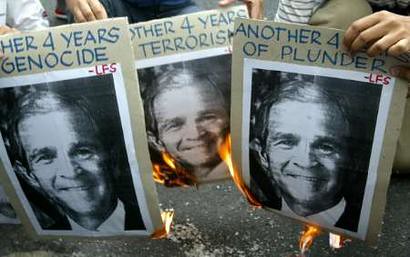
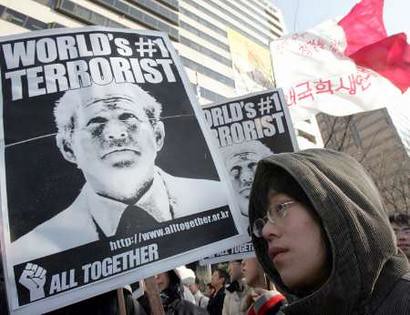
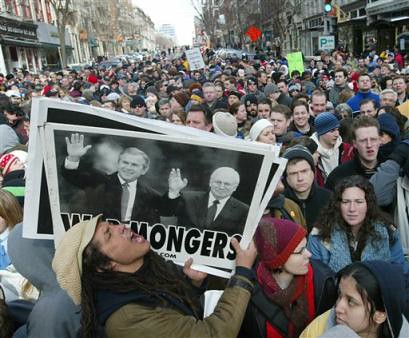
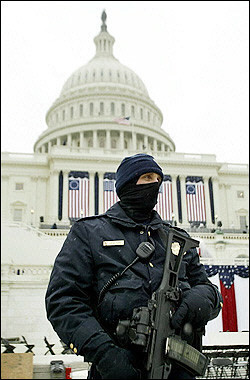
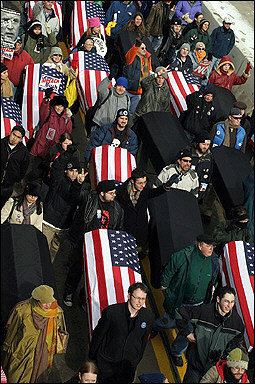
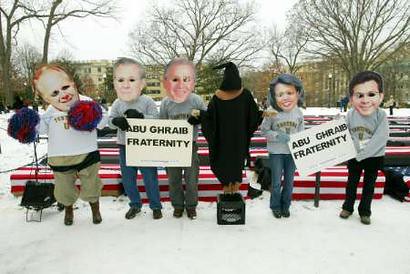
Union Song from the album "Axis Of Justice Concert Series Vol. 1" by The Nightwatchman
200 ARMORED HUMVEES
or
20 MIllion disease vaccinations for tsunami victims
(Zig Heil, Baby!)

(Cheney takes the customary inaugural tinkle on the Constitution)

In 1945 knee deep in the second world war, FDR's inauguration axed both parades and balls. Instead they had a 6 minute ceremony that cost $2000 which consisted of chicken salad. Then it was back to work.




CBS Poll: No Second Honeymoon
NEW YORK, Jan. 19, 2005
As President Bush heads into his second term, a CBS News/New York Times poll
finds a widespread feeling among Americans that the nation is headed in
the wrong direction and little expectation that Mr. Bush's policies
will change things over the next four years.
Fifty-eight percent of Americans say their outlook on a second Bush
term is generally optimistic – a low number when compared to Mr. Bush's
approval rating before his first term or Bill Clinton's before his
second. At the same time, 56 percent say the country is on the wrong
track, versus 39 percent who say it is on the right track.
Looking four years down the line, most Americans see very little
changing, despite the ambitious agenda Mr. Bush is laying out for his
second term.
Most expect they will be as safe from terror at the end of a second
Bush term as they are today, but not safer. They think the economy and
education system will be the same, but not better.
Despite Mr. Bush's focus on tax cuts, 41 percent of Americans say
their taxes will be higher in four years, while just 9 percent say
their taxes will be lower; 47 percent expect their taxes to be the
same.
While Mr. Bush has a stated goal of cutting the national deficit in
half, two-thirds of Americans expect the deficit to be higher after
four years.
A slight plurality of Americans, 38 percent, say there will be
fewer U.S. troops in Iraq by the end of a second Bush term. But 30
percent say there will be more, and 28 percent say the number will be
the same.
As for the most ambitious and controversial item on Mr. Bush's
agenda – overhauling Social Security - Americans expect to see big
changes by 2008. But 50 percent say Mr. Bush's call for private
retirement savings accounts is a bad idea, versus 45 percent who say
it's a good idea.
Support for Social Security privatization drops even lower when
people are informed it would mean cuts in the guaranteed benefits paid
to retirees. Seventy-eight percent say combining benefit cuts and
private investment accounts is a bad idea.
Moreover, six in ten Americans say it's unlikely they'd even
participate in a system that allows them to invest their Social
Security taxes in the stock market. Only 17 percent say they'd be very
likely to do so, with another 22 percent somewhat likely.
Those already actively investing in the stock market and those
making over $100,000 a year are the most receptive to private Social
Security accounts.
While Mr. Bush has spoken recently of the need to heal the wounds
of the divisive election, the public remains highly partisan and
dubious that he can unite them. Just 44 percent of Americans believe he
will bring the country together, while 47 percent think he will divide
them.
Mr. Bush's 49 percent approval rating at the start of his second
term trails every re-elected U.S. president in the past half-century.
By comparison, Bill Clinton's approval rating was 60 percent, Ronald
Reagan's 62 percent and Dwight Eisenhower's 73 percent at a similar
point in their careers.
Even Richard Nixon — just a year and a half before he was forced to
resign the presidency — fared better than Mr. Bush with an approval
rating of 51 percent when he took his second oath of office in January
1973.
Mr. Bush's approval rating, however, has risen significantly since
its low mark of 41 percent last May following a flood of violence in
Iraq. His highest rating, 90 percent, came in October 2001, just after
the Sept. 11 terrorist attacks.
Mr. Bush's handling of the war on terrorism remains his strongest
suit in the eyes of the public, earning 56 percent approval. He also
gets high marks for his response to the recent Asian tsunami.
On a personal level, 44 percent of Americans have a favorable
opinion of Mr. Bush, while 40 percent view him unfavorably. These views
have remained stable since last January.






Union Song from the album "Axis Of Justice Concert Series Vol. 1" by The Nightwatchman
Comments:
Post a Comment